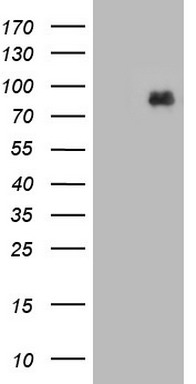MDM2 Mouse Monoclonal Antibody [Clone ID: OTI16H3]
CAT#: TA804701
MDM2 mouse monoclonal antibody, clone OTI16H3 (formerly 16H3)
Size: 30 ul
Formulation: Carrier Free
Specifications
| Product Data | |
| Clone Name | OTI16H3 |
| Applications | WB |
| Recommended Dilution | WB 1:2000 |
| Reactivities | Human |
| Host | Mouse |
| Isotype | IgG2a |
| Clonality | Monoclonal |
| Immunogen | Human recombinant protein fragment corresponding to amino acids 119-438 of human MDM2 (NP_002383) produced in E.coli. |
| Formulation | PBS (PH 7.3) containing 1% BSA, 50% glycerol and 0.02% sodium azide. |
| Concentration | 1 mg/ml |
| Purification | Purified from mouse ascites fluids or tissue culture supernatant by affinity chromatography (protein A/G) |
| Conjugation | Unconjugated |
| Storage | Store at -20°C as received. |
| Stability | Stable for 12 months from date of receipt. |
| Predicted Protein Size | 55.8 kDa |
| Gene Name | MDM2 proto-oncogene |
| Database Link | |
| Background | This gene encodes a nuclear-localized E3 ubiquitin ligase. The encoded protein can promote tumor formation by targeting tumor suppressor proteins, such as p53, for proteasomal degradation. This gene is itself transcriptionally-regulated by p53. Overexpression or amplification of this locus is detected in a variety of different cancers. There is a pseudogene for this gene on chromosome 2. Alternative splicing results in a multitude of transcript variants, many of which may be expressed only in tumor cells. [provided by RefSeq, Jun 2013] |
| Synonyms | ACTFS; hdm2; HDMX |
| Reference Data | |
| Protein Families | Druggable Genome, Transcription Factors |
| Protein Pathways | Bladder cancer, Cell cycle, Chronic myeloid leukemia, Endocytosis, Glioma, Melanoma, p53 signaling pathway, Pathways in cancer, Prostate cancer, Ubiquitin mediated proteolysis |
Documents
| Product Manuals |
| FAQs |
| SDS |
Resources
| Antibody Resources |
{0} Product Review(s)
Be the first one to submit a review






























































































































































































































































 Germany
Germany
 Japan
Japan
 United Kingdom
United Kingdom
 China
China




